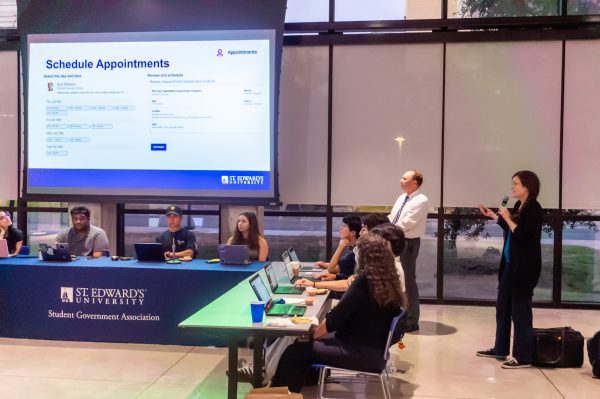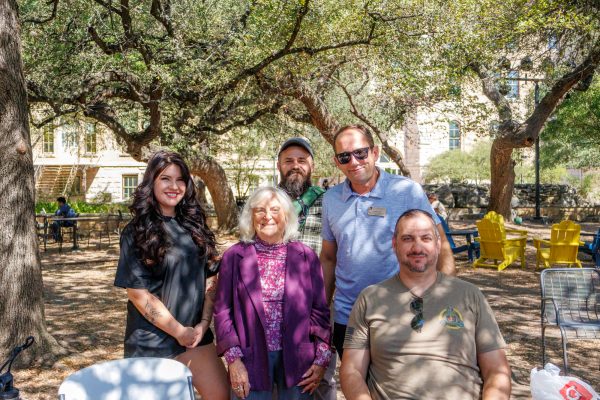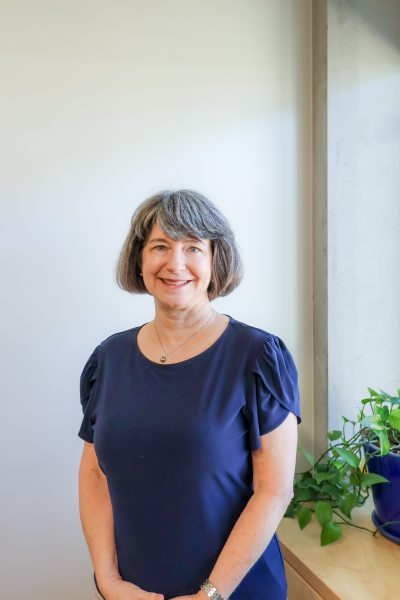Panel discusses U.S. foreign policy
Diplomats and foreign policymakers from the United States and abroad gathered at St. Edward’s University Oct. 19 for a panel discussion on the direction and state of U.S. foreign policy under President Barack Obama’s administration.
Organized by the Kozmetsky Center for Excellence in Global Finance, the seven guests each spoke for about 10 minutes and then fielded questions from the packed Mabee ballrooms.
Dozens of subjects were addressed over the course of the evening, but a common theme all speakers returned to was the marked shift in leadership style that has come with the Obama administration.
Anthony Quianton, a former U.S. Ambassador to Nicaragua, Kuwait, and Peru, described Obama’s policies as showing a new willingness to engage. Quainton said that to him, it reflected a disposition to listen rather than to lecture.
“The problem with foreign policy is that the guiding reality is not change, but continuity,” Quianton said.
Theodore Piccone, senior fellow at the Brookings Institution, pointed to the case of Hillary Clinton this summer, who initially signaled to China that the United States didn’t want to see human rights concerns get in the way of good economic relations.
The lone representative of business interests on the panel, Executive Vice President and general counsel of CropLife America Douglas Nelson, indicated he foresees continued tensions with international trading partners, like Canada, because of discrepancies between professed free trade goals and large domestic agricultural subsidies.
What Obama has been able to bring to the world table, most panelists agreed, is encouragement. Margaret Crahan, the former director of the Kozmetsky Center, said Obama’s recent Nobel Peace Prize win reflects as much.
“I regard the Nobel Peace Prize as another stimulus package,” Crahan said. “That is, an encouragement to live up, not only to his campaign promises, but also to some of the statements which he has made since becoming president.”
She was especially concerned with those regarding the spread of democracy as well as getting the United States to sign major international human rights treaties, including the Treaty for the Rights of Women.
Several speakers addressed the expectations Americans have for Obama. Javier Sandomingo Núñez, Spanish ambassador to Peru, said he also thinks these expectations are unusually high in Europe and Latin America. It will be difficult for the administration to fulfill them all, he said, especially since Núñez claimed Europe and Latin America are also not priorities for Obama right now.
However, Elaine White, former vice-minister of foreign affairs for Costa Rica, said Obama has still done more than most U.S. presidents have to signal to Latin America a willingness to listen to countries’ concerns, pointing to the example of Obama sticking around after his speech at the most recent Summit of the Americas to listen to the speeches of other American leaders, behavior that differs sharply with that of previous presidents.
The question, White said, was whether these types of changes will translate into benefits on the international stage.
Ambassador Miguell Marín-Bosch of the Mexican Foreign Ministry pointed to Obama’s emphasis on multilateralism as one of his distinguishing characteristics. And he said Obama was the only presidential candidate, other than Dennis Kucinich, to raise the question of elimination of nuclear weapons.
Marín-Bosch said Obama must reactivate bilateral negotiations with Russia and “convince his nuclear-weapon state partners, especially France, that nuclear disarmament…is good, and good for you,” instead of simply focusing on disarming Iran.
Núñez also had recommendations for the Obama administration with regards to Latin America. He highlighted the so-called war on drugs as something that needs rethinking, as well as what is to be done about the ballooning gap between Latin America’s rich and poor. The presidencies of Evo Morales and Hugo Chavez are examples of the natural consequences of this growing divide, he said.
“They are there because it is inevitable that someone like that tries to give solutions to problems that have been there, not only for years, but for centuries,” Núñez said.





